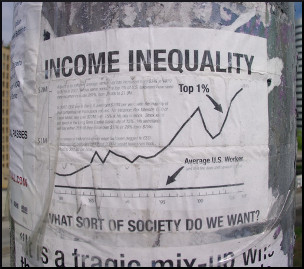
When discussing the disparity between big boss pay and average worker pay, the first thing the defenders want us to know is that if top executives let their enormous paychecks be divided among the workers, each piece of the pie would be quite small.
Walmart has a million hourly employees, and 475,000 of them make more than $25,000 per year. For the purpose of this exercise, Danielle Kurtzleben leaves out those upper-tier employees. The other 525,000 workers make less. The CEO, C. Douglas McMillon, makes $25.6 million annually. If he turned over $20 million for distribution among those 525,000 employees, they would each gain only $38 per year.
When cited by industry apologists (which Kurtzleben definitely is not, by the way), examples like this are supposed to convince us to stop picking on the business world’s poor, abused CEOs. But why shouldn’t we encourage such sharing? Even if it is only $38 extra, the workers need it more than Mr. McMillon does. When a family survives on food stamps, every little bit helps. And just think what such a gesture would do for morale and public relations!
Could something like that happen?
Actually, something like that could happen, and very recently it did. At Kentucky State University, interim President Raymond Burse made news by volunteering for a $90,000 pay cut so that 24 low-income employees could have a raise. It will boost their pay rate from $7.25 to $10.25 per hour (and the institution promises to continue paying the higher wage for those positions in the future). This is a very generous example for anyone in an executive position to set, though not a totally unprecedented one.
For the Christian Science Monitor, Hayley Fox notes that at Virginia’s Hampton University, President William Harvey refused a portion, amounting to more than $1 million, of his executive compensation so that low-wage workers could be paid more. No doubt there are other examples of highly paid yet ethically aware earners trying to compensate for the system’s unfairness. Maybe this trend pioneered in academia will spread to other businesses.
But let’s get back to those who see nothing wrong with the huge discrepancy between our society’s most generously and most stingily rewarded employees. They would have us believe that everything is made right by the Earned Income Tax Credit (EITC) — which Richard R. Troxell of House the Homeless calls the biggest scam ever perpetrated against America’s working poor.
First, you jump through the bureaucratic hoops of the application process to get back your own money that you should have had all along. And a crisis requiring money does not wait for our schedule or the government’s convenience. Mainly, the EITC is “chump change” in comparison with — and an unsatisfactory substitute for — a Living Wage that affords a family the basic necessities of life. Richard says:
Business has shifted their financial responsibility of paying a “fair wage for a fair day’s work” onto the backs of the taxpayers of America. The Federal Government has allowed the businesses of America to shirk their responsibility to pay fair minimum wages. Instead of paying what their work is worth, businesses hide behind the pitifully small tax supported stipend that leaves core American workers dirt poor and often subject to homelessness.
We will talk more about income inequality next time, but let’s just mention a few of the reasons why it is bad for the entire country. First, it’s different from general, all-encompassing poverty. Many people who grew up in the 1930s, during the Great Depression, have said they had no consciousness of being poor because everyone was equally destitute, and there was no basis for comparison. Nowadays, all who live in poverty are acutely conscious of exactly what the rich own and spend.
Historically, the consequences of extreme wealth disparity are crippling debt, a reduced standard of wellness, and economic stagnation for many individuals who had hoped and expected to better their circumstances. There is even research from the field of evolutionary psychology to show that when the difference between the highest incomes and the lowest is vast, the murder rate increases. Throughout the economy, general health and growth are negatively affected and homelessness is rampant. The processes of democracy suffer, and the political system is dangerously destabilized as the poor realize how devotedly the government serves the wealthy few. Unlike generalized and widespread poverty, an outrageous degree of inequality is very obvious. People can’t help noticing, and they don’t like what they see.
Source: “What if Walmart’s CEO took a pay cut for his workers?” Vox.com, 08/06/14
Source: “College president takes a $90,000 pay cut to give low-wage workers a raise,” CSMonitor.com, 08/15/14
Source: “CEO Of One Of The World’s Largest Banks: Income Inequality Is ‘Destabilizing,’ ThinkProgress.org, 06/13/14
Image by mSeattle
0


